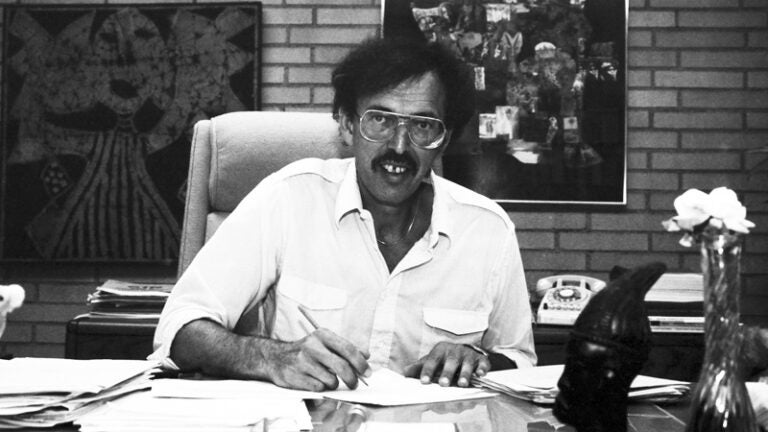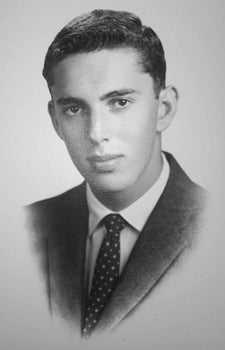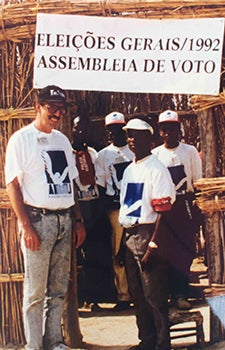
In Memoriam: Gerald “Jerry” Bender, 75
Associate Professor Emeritus of International Relations Gerald “Jerry” Bender, an Africanist who was considered one of the leading experts on Angola, died on May 22 in Los Angeles from emphysema and kidney failure. He was 75.
Bender’s career was dedicated to the study of the politics, languages and culture of Angola and southern Africa generally, with a particular interest in United States foreign policy toward the region. He traveled to Africa nearly 100 times and, according to friends and colleagues, served as an unofficial ambassador for the U.S. while remaining a passionate advocate for Angola and its people back at home.
“Jerry Bender liked to say that he was an activist scholar,” said Professor Emeritus of International Relations John Odell. “He wanted to intervene in U.S. foreign policy to make it better as well as teach and study the subject.”
While Bender was completing dissertation research in the mid-70s in Angola, then a Portuguese colony, civil war broke out. He met the leaders of the revolutionary movement, who eventually became the top leaders of the independent country.
“For decades he kept returning, maintaining those contacts,” Odell said. “Because of his remarkable expertise, Congress called on him to testify. He was proud of his contribution to passage of legislation during the 1970s to halt U.S. support for a counter-revolutionary movement in Angola.”
The moment everything changed

Jerry Bender’s graduation photo from Southwest High School in Minneapolis, 1959. Photo courtesy of Cindy Royce.
Bender was born on Nov. 27, 1941, in Minneapolis. His abiding interest in Africa came about by accident, according to his brother, Michael Bender. In 1959, Jerry Bender entered the University of Minnesota, Twin Cities, with the intention of becoming a lawyer. As a sophomore, he applied for a summer research grant to study community development in Nigeria, which led to his first trip to the African continent in 1962.
“That’s where he got hooked on Africa,” Michael Bender said. “Everything changed from then on.”
After earning his undergraduate degree in political science, Jerry Bender attended UCLA for his master’s and doctoral degrees in the same subject, completing an award-winning dissertation in 1975. He taught at a few universities in Southern California before coming to USC Dornsife in 1979.
Bender’s career teaching in the international relations department at USC Dornsife spanned three decades prior to his retirement in 2011. He also served as director of the School of International Relations from 1986–91.
Laurie Brand, Robert Grandford Wright Professor of International Relations and Middle East Studies, was hired by Bender.
“The love of what he studied and the degree of expertise he acquired over decades of research in and on Africa came through in any discussion with him,” she said. “It was one of the things that made him such an amazing colleague and a great gift that he always sought to share with his students.”
Bender was wise as a scholar and steadfast as a friend, said Professor of Communication and International Relations Jonathan Aronson. Bender was widely recognized as America’s leading expert on Angolan politics and society, a role he fully embraced.
“Jerry only slept two or three hours a night,” Aronson said. “This allowed one Angola desk officer at the State Department to call him to discuss daily developments in ‘his’ country every morning at around 4 a.m.”
Odell said that Bender and his late wife Tammy, having no children of their own, were extremely generous with their friends and to Bender’s students.
“For his students, he went well beyond lecturing and grading their papers,” he said. “He used his contacts in Africa to help them get internships, study-abroad opportunities and jobs. For some of them, he opened the door to a life-changing experience.”
Working to make things better
Over the years, Bender served as a consultant for the U.S. State Department, United Nations, World Bank, National Security Council, think tanks and several multinational corporations. He also worked with oil companies like Conoco, encouraging their investment in Angola, and mediated arguments among different African politicians and parties.

After 16 years of civil war in Angola, a peace deal led to the independent nation’s first elections in 1992. Jerry Bender is pictured with local election workers. Photo courtesy of Cindy Royce.
Bender was the author of the Tunney amendment (named for California U.S. Senator John Tunney) that prohibited covert CIA activity in southern Africa in the ’70s.
“Jerry made connections to better the lives of people in Angola,” said his sister, Sandie Taylor.
Bender was an excellent networker and used the skill for good, added his brother.
“He would connect business contract negotiations with government goals and come out with hospitals and libraries,” Michael Bender said. “He undertook millions of little projects that helped people, whether addressing AIDS in Angola through his connections or encouraging oil companies to invest in local communities.”
Jerry Bender published numerous academic papers and dozens of articles in leading American newspapers.
He is the author of Angola under the Portuguese: The Myth and the Reality (1978), which was published in three languages; co-author of African Crisis Areas and U.S. Foreign Policy (1985); and editor of International Affairs in Africa (1987). He lectured extensively and was an important adviser to several major political leaders in the U.S. and Africa. Bender was affiliated with nearly a dozen professional organizations and was elected national president of the African Studies Association.
Bender received seven teaching awards during his career, including the USC Associates Award for Excellence in Teaching — the USC faculty’s highest honor for intellectual and artistic achievement and outstanding teaching — in 1985.
‘Research by friendship’
Bender is remembered as a colorful personality with an undeniable sense of humor who loved telling stories as much as he loved jazz and Brazilian music. A former international relations doctoral student, Witney Schneidman ’87, recalled that every time Bender would go to Angola he’d bring a suitcase full of Brazilian music that he had recorded on cassette tapes and that he would give to his many friends there.
“I’d always make sure I got copies of the tapes. The music was fabulous,” said Schneidman, whose impressive career has included working for African Affairs at the U.S. State Department and the World Bank, and as senior international advisor for Africa at a legal firm in Washington, D.C.
“Jerry gave me the space to inquire and to grow intellectually. He helped me win a grant from the Gulbenkian Foundation to study in Portugal. I had always wanted to make policy for Africa, and Jerry helped me achieve that goal.”
Another doctoral student who studied with Bender in the ’90s, James Moore, spoke of the professor’s commitment to not only his students, but to Angola and its people.
“Jerry was a pioneer,” Moore said. “He went to study Angola before 99 percent of the globe’s population could have even found it on a map. And while Jerry was a political scientist by training, he was an anthropologist and humanist by nature. As steeped as his work was in historical data and archival research, his greatest insights came from people and stories. If ever a new form of research methodology were to be recognized by the academy, Jerry’s ‘research by friendship’ should be it.”
Bender is survived by his sister Sandie Taylor; brother Michael Bender; sister-in-law Cindy Royce; niece Melanie Taylor; and great nieces Talia and Juliana Martino.
A Celebration of Life service will be held on July 8 on the University Park campus.